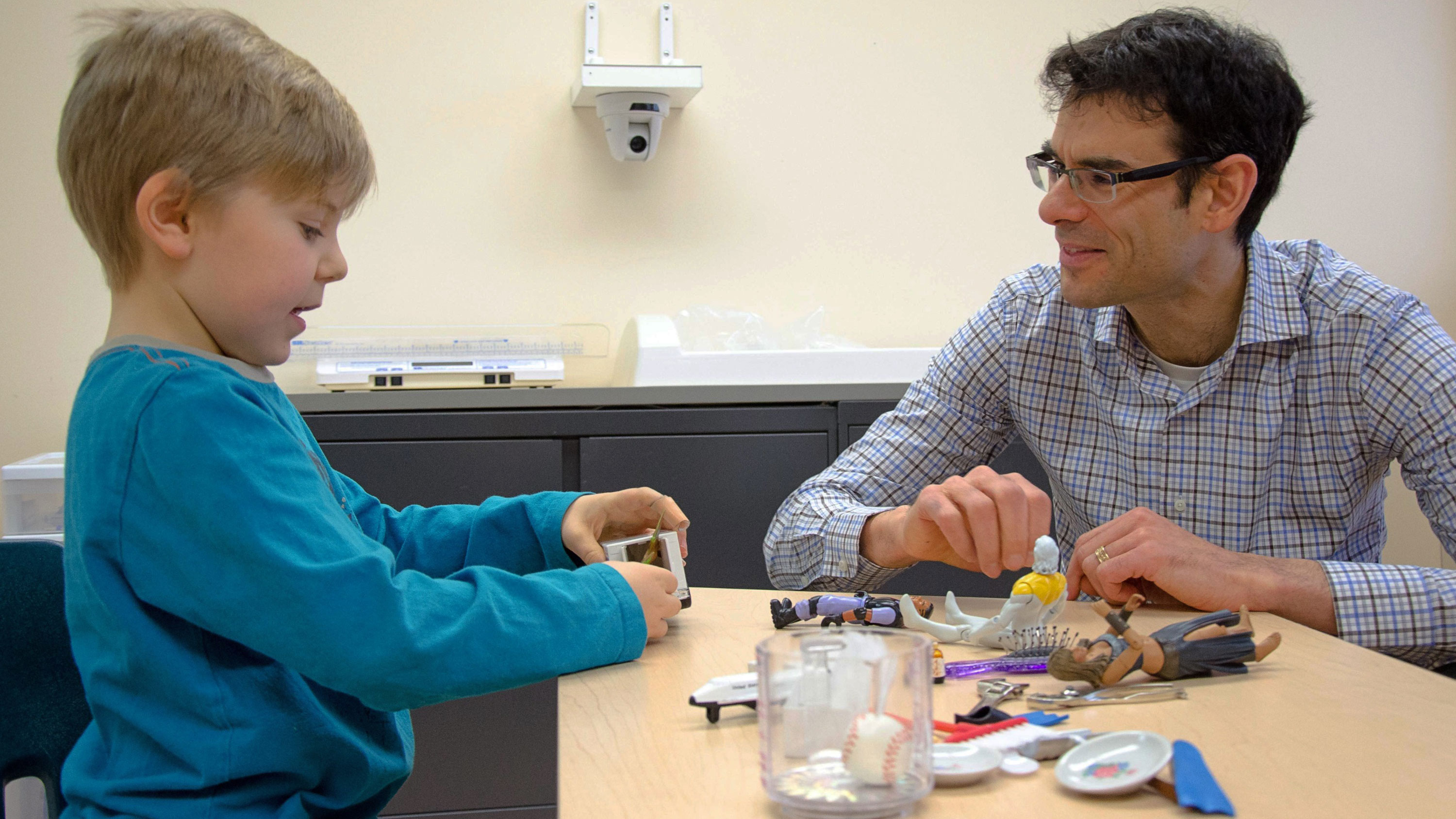FoMD in the News
Ross Neitz - 8 February 2021
This is a roundup of relevant news and media stories involving the Faculty of Medicine & Dentistry. We appreciate you relaying information that is relevant to faculty members in your respective areas.
TOP STORIES

CTV News: Signs of autism can be detected in infants: U of A researchers
Early intervention can greatly improve outcomes for children with autism, and researchers at the University of Alberta have successfully predicted diagnoses using signs detected in infants as young as 12 months old. Lonnie Zwaigenbaum, professor of pediatrics, is interviewed. Coverage also appears on CTV Morning Live and Global News.

CTV News Edmonton: New drug that could treat aggressive forms of cancer created at U of A
John Mackey, professor of oncology at the U of A, is interviewed about a new drug that could treat breast and blood cancers. The new drug, PCLX-001, is set to begin human trials later this year.

Maclean’s: How quickly will the COVID-19 vaccines start curbing the pandemic in Canada?
“If we are vaccinating older people first, we will see reduced deaths and hospitalizations essentially within a month of the [widespread] vaccine rollout,” said Lynora Saxinger, after plans were unveiled to vaccinate three million Canadians by the end of March 2021.
RESEARCH
Radio Canada International: Canadian research identifies walking speed as predictor of dementia
The speed at which you walk, or the so-called gait speed, might be a predictor of dementia, according to new research by a Canadian research team that included U of A professor of medicine Richard Camicioli.
Journal Pioneer: ‘Queering Cancer’ website creates community for LGBTQ+ cancer patients
A new initiative was co-developed by researchers from the U of A, University of the Fraser Valley and Queen's University aimed at creating a supportive online community for LGBTQ+ cancer patients.
Story references a study published by U of A researchers more than three years after the Fort McMurray wildfires that found 37 per cent of 3,000 area students surveyed matched the criteria for PTSD, and 17 per cent dealt with depression of moderate severity.
Article on Hilary Duff's claim that she got an eye infection from frequent COVID-19 tests. A U of A study was cited in the story that found that conjunctivitis can be a primary symptom of COVID-19.
CBC News: Anti-viral cat medication may show promise for humans with COVID-19: U of A researchers
Infectious-disease specialist Ilan Schwartz is interviewed about research he is conducting as part of a team looking into the possibility that we could learn a thing or two from cat medications. Schwartz says one of those antivirals shows promise for the treatment of humans.
CBC News: Canadian professor gaining recognition for role in discovering insulin 100 years ago
The contribution of U of A professor James Collip 99 years ago is discussed in this story. With insulin centenary celebrations approaching, there is movement in Alberta and Ontario to recognize Collip's role in the discovery.
Calgary Herald: Nieman: Sleep studies to keep you up at night
This health column discussing the critical role of restful sleep references a sleep study conducted by the Department of Medicine’s Subhabrata Moitra, indicating a link between teenagers who go to bed late and the development of allergies.
Jasneet Parmar, an associate professor in the Department of Family Medicine, leads a study showing that the stress of the COVID-19 pandemic is funnelling down the line and adding to the burden on Albertans who provide care to loved ones. Parmar said many caregivers spend from morning until night providing for family members.
Global News: Edmonton Transit partners with local company on germ-killing pilot project
Research conducted through the University of Alberta Health Accelerator and TEC Edmonton has resulted in a partnership between startup company Outbreaker Solutions and the City of Edmonton, on a pilot project that will see innovative germ-killing push plates made of salt installed on several doors at some transit centres and LRT stations. Coverage is also provided by CTV News Edmonton, CityNews Edmonton/Calgary and the Edmonton Journal/Sun.
Global News: Three Alberta clinics study long-term effects of COVID-19, lasting symptoms
A U of A-affiliated clinic is one of three collecting data to help doctors better understand post-COVID-19 symptoms. The idea for the two clinics in Calgary and one in Edmonton came from Alberta doctors monitoring international data on post-COVID-19 issues, knowing there have been post-viral issues following H1N1, MERS and SARS.
Global News: Making snow angels for a diabetes cure
A fundraising campaign of making snow angels is highlighted. The campaign is raising money for professor of surgery and ADI member James Shapiro's diabetes research.
News Radio 1330: Women face higher risk of death or heart failure after a heart attack
Justin Ezekowitz, a professor of medicine at the U of A, is interviewed about the findings of this study.
CTV News Edmonton: This machine could help diagnose schizophrenia earlier: U of A study
Sunil Kalmady Vasu, a senior machine learning specialist with the Faculty of Medicine & Dentistry, is interviewed about the development of a machine-learning tool that analyzes brain scans to identify the risk of a schizophrenia diagnosis. Coverage also appears on Health Tech World, Global News Radio, News Medical and Science Daily.
EXPERTS
CBC News: Winnipeg Airports Authority pushes for on-site COVID-19 testing
Data shows that just one per cent of travellers outside of Canada were infected with COVID-19. U of A infectious-disease expert Lynora Saxinger says airport testing programs have benefits but are not foolproof.
CTV News Channel: Pandemic to get worse before it gets better
Lynora Saxinger said it is clear that the carryout of the COVID-19 containment has been a challenge, and we have failed to prevent this wave of infection.
CTV News Channel: Q and A on COVID-19
Lynora Saxinger answers various questions viewers have about COVID-19.
Lynora Saxinger called the move “completely justifiable,” though she understands why some people are worried that the practice hasn’t been studied. Saxinger said while there’s little direct evidence about altering the vaccine dose schedule, experience with other vaccines suggests it’s not a problem. In some cases, immune responses benefit from a longer wait, she said. Saxinger is also interviewed in a CBC News story about a rapid screening test being developed to check for COVID-19 variants in Alberta.
Toronto Star: Can you change your metabolism? We asked an expert
U of A obesity expert Arya Sharma talks about resetting your metabolism.
Global News: Alberta doctors levy criticism over province’s COVID-19 vaccine rollout
Noel Gibney, a professor emeritus in the Department of Critical Care Medicine, said the province should have met its goal of 29,000 doses by the end of 2020 if only to prove that it could reach that benchmark. To avoid another wave in the fall, Gibney said vaccinations would need to hover around 30,000 people a day between now and the end of August.
The Guardian: For mRNA vaccines, we should stick to the schedule
In this op-ed co-written by U of A infectious-disease specialist Ilan Schwartz and virologist Angela Rasmussen, the authors argue that vaccination schedules must be adhered to.
Vox: Should we give one dose of the Covid-19 vaccine to more people? The debate, explained
“We must not snatch defeat from the jaws of victory by administering vaccines in any way besides that for which they were carefully evaluated,” Georgetown virologist Angela Rasmussen and U of A infectious-disease specialist Ilan Schwartz argued in The Guardian, citing worries that we don’t know how long immunity lasts and that partial immunity could invite the spread of strains that the virus doesn’t address.
New York Times: 2 Arthritis Drugs Reduce Deaths in Very Ill Covid Patients, Study Finds
Ilan Schwartz is interviewed as a third-party expert about the findings of a new study showing that some arthritis drugs can help gravely ill COVID-19 patients. He called the findings "impressive."
U of A infectious-disease expert Stephanie Smith said her preference would be for the current restrictions to remain in place for at least another four weeks.
ExBulletin: Studies show that plasma reduces the risk of severe COVID-19 when given early
U of A infectious-disease specialist Ilan Schwartz said despite the good news, it will be difficult to find and diagnose patients in time.
The Globe and Mail: Quebec further delaying second dose of COVID-19 vaccines
Ilan Schwartz comments on Quebec's decision to not begin administering the second shot of the COVID-19 vaccines until mid-March. He said it is “potentially risky” to change the vaccination regimen just when the new drugs offer the prospect of beating back the virus when used as recommended. Schwartz is also interviewed in a CTV News story about what the appearance of a more easily transmissible variant of COVID-19 could mean for an already unruly spread of the disease.
CBC Radio: How to battle that 'Blue Monday' feeling
Peter Silverstone, professor of psychiatry at the U of A, is interviewed on the topic of “Blue Monday” and suggests getting exercise can help.
Alberta Primetime: Vaccine rollout discussed
Lorne Tyrrell, director of the Li Ka Shing Institute of Virology, discusses the many factors that can complicate vaccine rollout and talks about ongoing vaccine development, including research in Alberta.
CBC News: What's different about the coronavirus 'variants of concern' flagged by WHO
Infectious-disease specialist Lynora Saxinger is interviewed about the fear that new coronavirus variants will lead to more hospitalizations and deaths by spreading much more easily to more people. She'd like to see more surveillance of variants, as well as other precautions.
Lynora Saxinger is interviewed about whether to delay second doses in order to get more people vaccinated with a first dose. In an ideal world, we’d have a consistent vaccine supply and would always use it in the recommended way, but as a pandemic rages, sometimes you need to be willing to try to protect more people sooner, Saxinger said. “I think that the urgency to gamble is directly related to your vaccine supply and how severe your problem is,” she said, pointing to the United Kingdom’s decision.
Global News: Coronavirus: Questions swirl around what’s needed to achieve herd immunity
Lynora Saxinger said there has been a range of estimates for herd immunity around the 60 per cent mark. As well, U of A virologist Michael Houghton serves on a town-hall panel of experts to answer pressing questions about COVID-19 (Globe and Mail).
Global News: What to know about second doses of COVID-19 vaccine in Alberta as shortages persist
U of A infectious-disease specialist Ilan Schwartz is interviewed about the vaccine shortage, noting that while there is data showing the initial vaccination is effective in mounting an immune response, there isn’t data for the full followup period if only one dose is administered.
Calgary Herald: Doctors say education needed as one-in-five Albertans plan to shun vaccine
Ilan Schwartz said there has been a “successful” movement by people who reject science and subscribe to conspiracy theories to dissuade others from getting vaccinated, suggesting it could cause more harm than COVID-19. This is the furthest thing from the truth, said Schwartz, but it can sow doubt. Story also runs in the Edmonton Journal/Sun.
Daisy Fung, an assistant clinical professor of family medicine at the U of A, is interviewed in this story about a COVID-19 outbreak at a west Edmonton long-term care facility, now considered the deadliest in the province. She said the virus appears to have spread, often undetected, during the first critical days of the Lynnwood outbreak.
Calgary Herald: Military veteran seeks magic mushroom therapy to combat PTSD
Peter Silverstone, professor of psychiatry at the U of A, is interviewed in this story about a master corporal who hopes to become the country’s first military veteran to undergo legal, supervised psilocybin therapy. Silverstone said he’s convinced of the medicinal properties of psilocybin and hopes the federal government grants the exemption, as long as the therapy is conducted properly.
U of A cardiologist Marcelo Shibata expresses concern about how the pandemic is interfering with every stage of care for patients with potentially life-threatening heart problems.
The Globe and Mail: Nova Scotia discovers grassroots success with COVID-19 rapid-test kits
William Stokes, a clinical lecturer with the Department of Laboratory Medicine & Pathology, is interviewed about rapid tests and how they are being deployed in Alberta. (story behind paywall)
CBC Radio: Vigilance needed to battle COVID-19 variants
U of A infectious-disease specialist Lynora Saxinger says in the face of new strains of COVID-19 now in Alberta, it's more important than ever to follow public health restrictions.
Edmonton Journal: COVID-19 variants in Alberta: Q & A with infectious disease expert
Infectious-disease specialist Stephanie Smith answers questions about the significance of these different strains, how they differ from that currently circulating in Alberta, and if our vaccines and health rules will be effective in stopping them from spreading widely. Story also runs in the Edmonton Sun, Calgary Herald and Calgary Sun.
iNews 880: Double-masking probably not necessary
Stephanie Smith says double-masking likely won't provide better protection than one well-fitting single mask, but advises people to continue to wash their hands, limit outings and social distance.
PEOPLE, PARTNERSHIPS AND EDUCATION
Global News Edmonton: 5 Edmontonians receive appointments to the Order of Canada
Pediatric cardiologist Lori West has been named an officer of the Order of Canada.
When Ukraine International Airlines Flight PS752 was shot down on Jan. 8, 2020, it killed 176 passengers and crew. Among them were a number of members of the U of A community. Related coverage appears in stories from the Edmonton Journal, Global News Edmonton, Canadian Press, Toronto Star
CityNews: University of Alberta continues to mourn one year after Iran plane missile attack
This news report takes a closer look at the victims of Flight 752 who had ties to the U of A, and the loss of their incredible talent. Coverage of a local memorial vigil runs in the Edmonton Journal and The Gateway. A Globe and Mail story (behind paywall) interviews Daniel Ghods-Esfahani, boyfriend of one of the victims, Saba Saadat, a talented student and researcher at the U of A. U of A president Bill Flanagan and former U of A president David Turpin are interviewed by CTV News Edmonton about the loss.
The Gateway: University announces first college deans, all three previous faculty deans
Three pre-existing U of A faculty deans will be moving up to fill the new position of college deans, each responsible for overseeing one of the three colleges recently established during academic restructuring. Matina Kalcounis-Rueppell (Science) will become the interim college dean for the College of Natural and Applied Sciences. Greta Cummings (Nursing) will become the college dean of the College of Health Sciences. Joseph Doucet (Business) will become the college dean of the College of Social Sciences and Humanities.
Ponoka News: Maskwacis Elder Mentoring Program connects Elders with young parents
Richard Oster, an assistant adjunct professor with the U of A’s Department of Obstetrics & Gynecology, is interviewed about the Maskwacis Elders Mentoring Program, which offers an opportunity for parents-to-be to receive support from Elders. Oster leads the program, which he calls an opportunity to rebuild intergenerational connections and pass on traditional teachings. Cultural reclamation, rebuilding severed ties and reconciliation are incorporated into what the Elders provide.